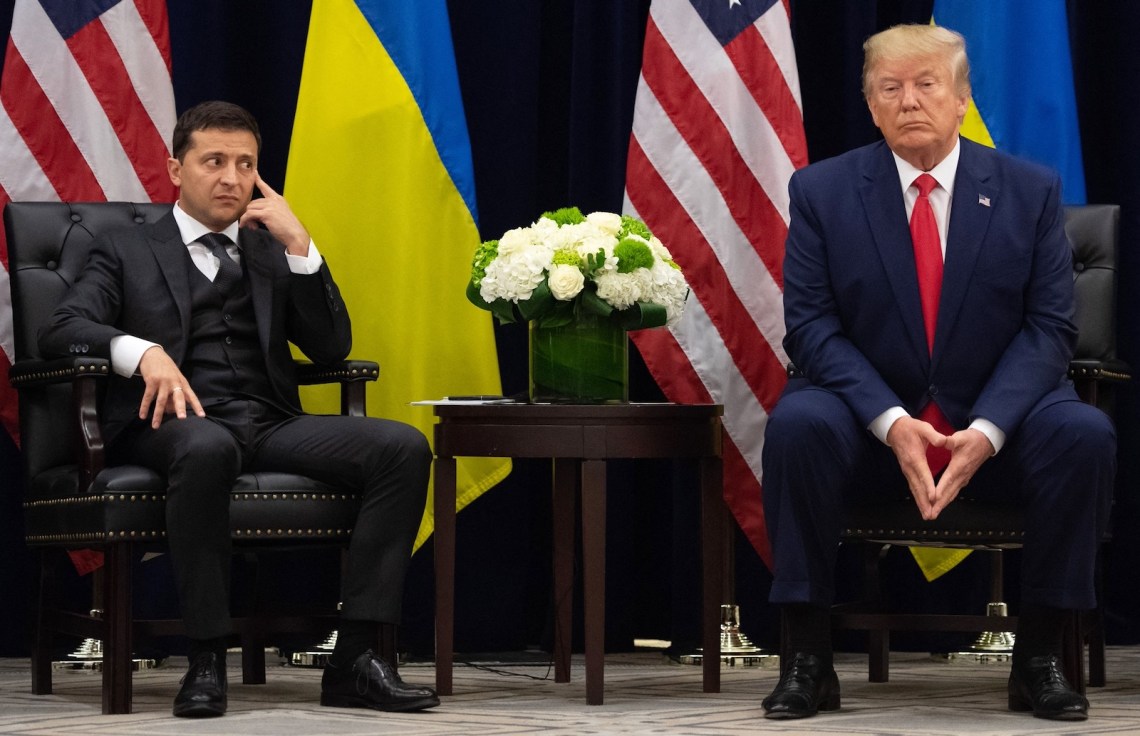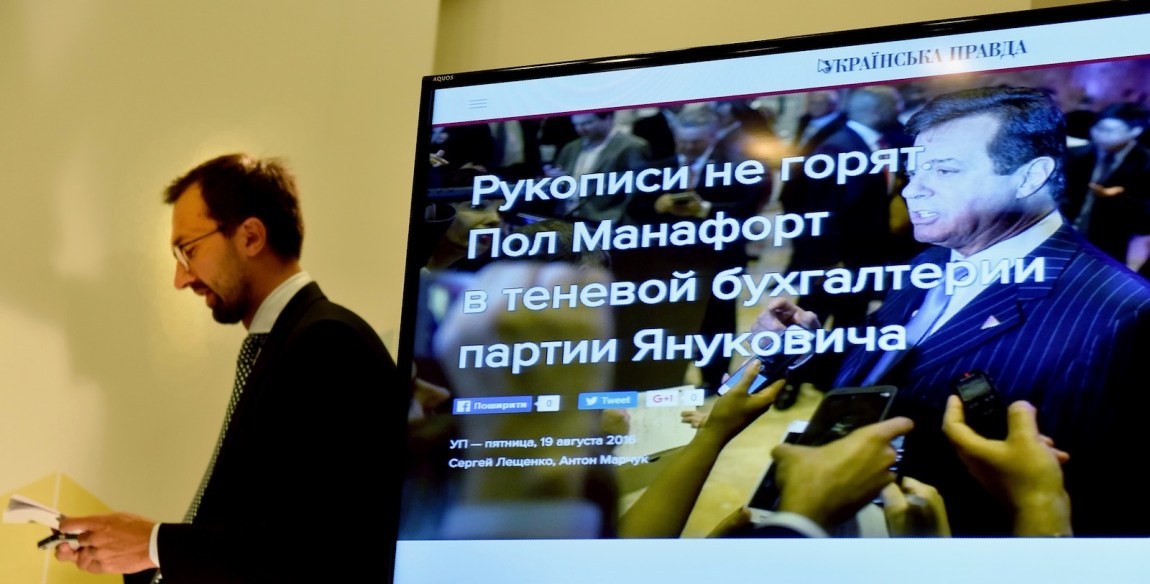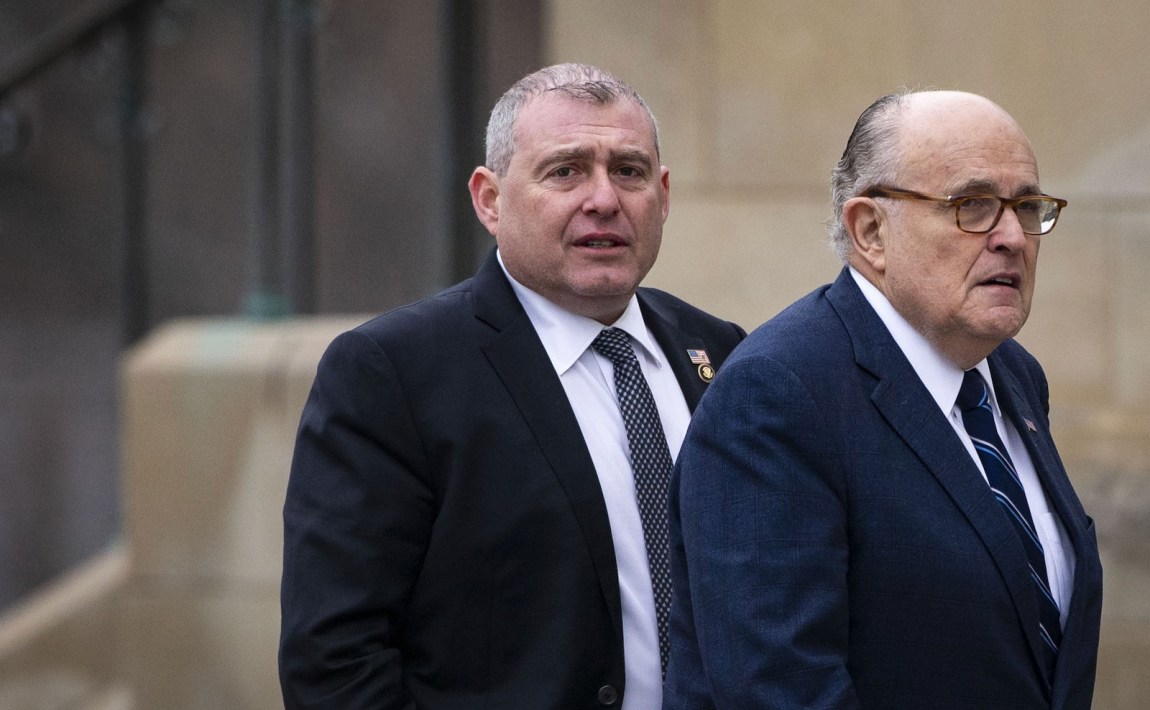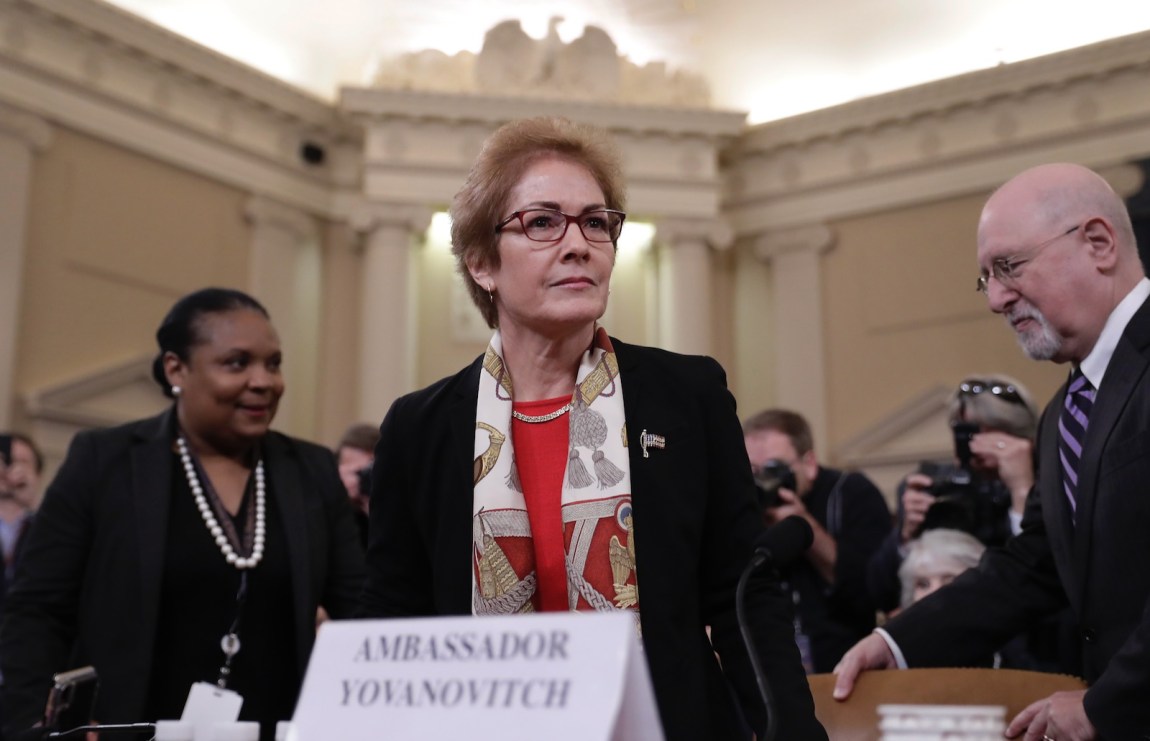Russian President Vladimir Putin, now a rogue leader and a singular menace to international security, sees Ukraine as having fallen under malign sway of the West and the CIA. To the extent that he had a credible pretext for invading and occupying Ukraine, it was that NATO has encroached on Russia’s traditional sphere of influence. But in fact, Washington’s most consequential involvement in Kyiv’s affairs to date has been Donald Trump’s intervention in them, and it was pro-Russian.
Republicans have criticized President Joe Biden for not doing more to arm the Ukrainians, yet fail to recognize that crucial US support was withheld years ago: they voted not to convict Trump in his first impeachment trial in the Senate, proceedings that the House of Representatives had precipitated over Trump’s making US assistance to Ukraine conditional on political favors. That observation barely scratches the surface of Republican hypocrisy on this front, but recounting the Trump administration’s corrosive relationship with Ukraine is not the vindictive resurrection of old talking points. Rather, it is essential to reckoning with his domestically and strategically calamitous presidency. Trump must be held accountable for weakening the US-led international, rules-based order, undermining US deterrence of a hostile and predatory Russia, and setting up Ukraine for Putin’s brutal and geopolitically ominous invasion.
Trump’s instrumental use of Ukraine for personal political advantage began with the government that preceded Volodymyr Zelensky’s, that of Petro Poroshenko, who was president from 2014 to 2019. Like Zelensky, Poroshenko saw US support as essential to shoring up Ukraine’s national security in light of Russia’s 2014 annexation of Crimea and fomenting of a separatist rebellion in the Donbas region. Trump himself evinced no special affection for Ukraine and placed no particular value on its independence, refusing when he was the Republican nominee in 2016 to condemn Moscow over its annexation of Crimea. His campaign manager, Paul Manafort, had advised the monumentally corrupt Ukrainian President Viktor Yanukovych, who advocated that his country distance itself from the West and align more closely Russia. In late 2016, Trump’s incoming national security adviser, Michael Flynn, signaled to Russia’s ambassador that the Trump administration would take a conciliatory approach to economic sanctions imposed by Obama—then a leading objective for President Putin.
Although the Trump campaign had required Manafort to resign in August 2016 after it was revealed—in part, by the investigative work of a Ukrainian journalist—that he had taken $12.7 million in secret cash payments from Yanukovych and his backers, the dismissal was a matter of appearance rather than principle. Convicted in 2017 on multiple charges related to his dealings with Yanukovych as a result of Special Counsel Robert Mueller’s investigation of 2016 Russian election interference, Manafort continued to advise Trump informally, including on Ukrainian matters, through his lawyers. (In this, Manafort was apparently angling for an implicit presidential pardon, which he eventually got. Likewise, while Flynn was compelled to resign as national security adviser after only three weeks on the job over lying about his pre-inauguration contacts with Russian officials for which he, too, was indicted, Trump pardoned him as well.)
Precisely because of the pro-Russian tilt of crucial members of Trump’s inner circle, Poroshenko felt compelled to be of great service to Trump. In 2017, to address energy shortages, Ukraine bought coal from US producers, nourishing the fossil fuel–based economy that Trump championed, and cultivated deeper business ties with the United States, making deals with American firms to buy locomotives and fuel for Ukrainian nuclear plants. Meanwhile, the former federal prosecutor and pro-Trump Republican politician Rudy Giuliani became a private consultant on crime for the city of Kyiv and on emergency services for the city of Kharkiv. Trump appointed him a cyber security adviser to the US government in 2017, and then, in 2018, retained him as his personal lawyer. Giuliani was well placed to secure special access to Poroshenko “as a friend of Trump,” according to Poroshenko’s foreign policy adviser, and the two presidents discussed defending Ukraine against Russian aggression.
Despite its pro-Western stance and ostensibly reformist agenda, Poroshenko’s government was dogged by accusations of the corruption that had plagued Ukraine during its post-Soviet oligarchic era. There had, in particular, been a history of politicized judicial actions: criminal investigations and prosecutions that served power, not the rule of law. That tradition seemed to be continuing when, in April 2018, Yuriy Lutsenko, Poroshenko’s prosecutor general, froze cases in Ukraine pertinent to the Mueller investigation, including one that traced the money paid by Ukrainian political figures to Manafort. At Manafort’s urging, Giuliani also enjoined Lutsenko to investigate Serhiy Leshchenko, the Ukrainian journalist who had first exposed Manafort’s involvement with Yanukovych—who may yet figure in Putin’s plans for Ukraine—and Alexandra Chalupa, a Ukrainian-American political consultant who had worked for the Democratic National Committee and who, they believed, was also involved with surfacing the story. Giuliani appeared on Fox News retailing the unfounded notion that the “black ledger” detailing Yanukovych’s payments to Manafort was a fabrication.
Advertisement
Giuliani was also attempting to make Hunter Biden’s business activities in Ukraine appear nefarious, and he persuaded Lutsenko to look into them, as well as into the equally baseless allegation that Joe Biden had tried to thwart investigations of his son’s dealings. Also in April 2018, having reversed an Obama-era ban on arms exports to Ukraine, the US finally did, after considerable delay, approve the sale of 210 Javelin anti-tank missiles and thirty-five launching units. But while Congress considered Russian provocations such as the Russian coast guard’s attack on Ukrainian vessels in the Kerch Strait in November 2018 to be dangerous escalations, the White House itself typically minimized them.
National security had ranked relatively low among Ukrainian voters’ concerns. In a November 2018 public opinion poll jointly conducted by the Kyiv International Institute of Sociology, the Razumkov Center, and the Rating Group, the Russian threat placed ninth among the problems facing the country, well behind economic stagnation and large-scale emigration. Given Poroshenko’s emphasis on national security, the Kerch Strait incident should have given him a considerable bump. But his apparent tolerance for corruption, and for persecution of those who opposed it, appeared to outweigh these factors. The effect of Trump’s machinations, in manipulating Ukraine’s legal system for political ends, can hardly have helped this negative perception of Poroshenko’s administration. The November 2018 poll also measured support for possible candidates in the upcoming 2019 election: former prime minister Yuliya Tymoshenko came first with 21 percent, followed by Zelensky—who had not yet announced his candidacy and would eventually win with 73 percent of the vote—at 11 percent, and then by Poroshenko with 10 percent. Poroshenko also had highest negative ratings: almost half of voters said that they would definitely not vote for him.
The deleterious impact of Trump’s interference on the electability of a strongly anti-Russian candidate may have changed Putin’s strategic calculus about invading Ukraine. Initially, as a candidate, Zelensky did not appear as anti-Russian as Poroshenko and, as a former TV comedian who was not a career politician, he looked to be a less formidable adversary. He had grown up speaking Russian and, as a celebrity entertainer, had spoken out against a proposed Ukrainian government ban on Russian artists.
Zelensky’s big win turned on his populist anti-corruption and anti-establishment platform. While most voters construed that stance as opposition to any return to the oligarchic, pro-Russian old guard, his campaign rhetoric was not stridently anti-Russian. He simply called for resolving Ukraine’s conflict with Russia in Donbas through dialogue with Putin.
As president, Zelensky did try to deliver on both planks of his platform—seeking to disempower oligarchs and stamp out corruption, while promoting national unity between the Ukrainian-speaking and Russian-speaking populations and seeking a political solution in Donbas. Only when Russia began its military buildup near Ukraine’s border in early 2021 did Zelensky ask NATO to expedite Ukraine’s membership. Even as a Russian invasion appeared imminent last month, Zelensky downplayed prospects of war and counseled calm. Since Russia invaded Ukraine and started the war, of course, he has confirmed his credentials as a defiant, indeed heroic, Ukrainian patriot beyond doubt. Putin, like the rest of the world, underestimated Zelensky.
*
Well before Zelensky became president, Ukraine’s national security had been for the Trump administration a matter for political bartering rather than considered US foreign policy. In fact, Zelensky’s landslide victory in the Ukrainian election in April 2019 threw a wrench into Trump’s efforts, insofar as Zelensky was an unknown quantity likely to be less malleable than Poroshenko had been. Even Poroshenko’s appointee as prosecutor general, Lutsenko, had a hard time finding dirt that would stick to the Bidens, stating publicly in May 2019 that they had done nothing illegal in Ukraine. Indeed, while Hunter Biden may have passively accepted the benefits of connections and name recognition in accepting a seat on the board of Burisma Holdings, a Ukrainian oil and gas company, and Joe Biden did actively oppose corruption in Ukraine, there was no evidence that either son or father did anything illicit.
That same month, Trump removed US ambassador Marie Yovanovitch, a distinguished career diplomat, who had championed anti-corruption Ukrainian reformers and thus impeded Giuliani’s attempts on Trump’s behalf to inveigle the Ukrainian government into investigating the Bidens. Lutsenko had paved the way for Yovanovitch’s ouster by targeting her with false allegations of corrupt interference, which the US State Department described as “an outright fabrication.” Zelensky, in contrast, quickly indicated that he was not planning to keep Lutsenko on and did indeed dismiss him in August that year.
Advertisement
Concerned that Ukraine’s new government would drop all efforts to taint the Bidens, Trump tried to extort Zelensky in the now-famous phone call of July 25, 2019, in which he pressured the Ukrainian president to publicly announce an investigation into Hunter Biden in exchange for the United States’ release of $400 million in congressionally authorized foreign assistance and a White House meeting with Zelensky. The withheld aid included military assets to reinforce Ukraine’s ability to resist Russian depredations that had begun in 2014 with Russia’s paramilitary infiltration of Ukraine and complete annexation of Crimea. Trump also importuned Zelensky to receive Giuliani in Kyiv.
Trump suggested to Zelensky that the source of foreign interference in the 2016 US presidential election was not Russia but Ukraine, reflecting a baseless White House narrative according to which the Democratic National Committee, Democratic donors, and Ukrainian officials had colluded to defeat Trump in 2016, and asked him to expose a phantom server supposedly owned by CrowdStrike, a California-based cyber security firm that the Hillary Clinton campaign had hired to examine the hacking of its emails. Russian misinformation had convinced Trump—as well as many viewers of Fox News and several Republican members of the House Intelligence Committee—that the server was located in Ukraine.
In the phone conversation with Zelensky, Trump was dismissive about any notion of Russian interference—as he had been publicly a year earlier in his notorious joint press conference in Helsinki with Putin. Although the then-recently released Mueller Report did not establish any criminal conspiracy between the Trump campaign and Russian hackers to promote Trump and discredit Clinton, it did find that the campaign knew about and “welcomed” Russians’ work in its favor. Trump labeled the investigation “nonsense” and Mueller himself “incompetent.” Although Zelensky was calculatedly ingratiating toward Trump on the call, in substance he deflected Trump’s entreaties and did not to commit to any specific action. Nor did he undertake any. Trump did not release the aid until September 11, only after the delay had become public and a whistleblower report had set in motion Trump’s first impeachment.
*
Coupled with Trump’s consistent denigration of NATO and lack of interest in European security, the phone call reflected something even more sobering than the “transactional” approach to foreign policy for which some Beltway pundits had rather euphemistically credited Trump. It revealed to the Ukrainian president that Trump was willing to subordinate Ukraine’s security to his own domestic political ambitions and to manipulate Ukraine’s governance to advance them. Beyond that, it indicated that Trump did not consider Putin’s revanchism in Eastern Europe a significant US concern. And it demonstrated that Trump had eviscerated the interagency process managed by the National Security Council for implementing US foreign policy; that decades-old practice, designed to safeguard vital national interests, was jettisoned in favor of an autocratic approach that allowed the kind of “drug deal,” to adopt then-national security adviser John Bolton’s apt metaphor, that Trump tried to pull off with Ukraine.
Although Trump was acquitted in the 2019 impeachment, thanks to party line voting, he was politically constrained thereafter from interfering with American assistance to Ukraine. No doubt aware of his increased leverage, Zelensky sought a greater level of support—and got it: the US pledged $680 million in foreign assistance to Ukraine in fiscal year 2020, the most since 1994. Of that, military aid increased by the highest amount, $200 million, to a total of $284 million. For fiscal year 2021, Congress funded the Ukraine Security Assistance Initiative, through which the incoming Biden administration immediately provided a $125 million military aid package. As the full-scale Russian military threat to Ukraine has intensified, US aid, including thousands of Javelins and hundreds of Stinger anti-aircraft missiles, has been flowing robustly. None of this, however, has been enough to offset Trump’s signal to Putin that Ukraine was an expendable pawn.
More broadly, Trump’s derogation of America’s standing appears to have degraded its power to deter military aggression. Ukrainian philosopher Volodymyr Yermolenko told New York Times columnist Michelle Goldberg that pro-Western reformers in Ukraine had seen the United States as a “a perfect democracy functioning very well,” with an admirable system of checks and balances, only to see that image “crumbling” under Trump. The integrity of American governance is central to American power, and Trump’s drug deal comprehensively debased it.
Democracy is fragile, as President Biden recognized in his inaugural address. He has expressed faith that the United States can regain the global respect, trust, and influence it has enjoyed for generations by virtue of its political example—a crucial component of its soft power—but only if it cleans up its own political house, which Trump tried to burn down on January 6, 2021.
It is worth noting, in this connection, that the House Select Committee’s mandate for investigating the January 6 attack on the Capitol extends to exploring “malign foreign influence” and, by implication, the potential exploitation of American political chaos by the United States’ geopolitical rivals. It’s true that Russia and Ukraine face an inexorable security dilemma, and that strategic tension between them is practically inevitable. At the same time, there seems little doubt that Putin factored in America’s deep political divisions and distractedness, in large part Trump’s legacy, to his decision to intervene in Ukraine. Even as Russian tanks rolled in, Trump continued to extol Putin’s “genius” and “savvy.” As Bolton himself put it, in an interview with Vice News earlier this month, Trump, by creating an “unnatural environment” in US–Ukraine relations centered on the Bidens’ illusory transgressions and election conspiracy theories, made it “that much easier for Putin” to invade Ukraine.
Russia’s recklessness has shattered the Ukrainians’ world, disrupted international security, and ratcheted up strategic instability in Europe. But it has also reinvigorated NATO’s cohesion and focus, galvanized transatlantic relations and resolve, and united most of the world against illiberal autocracy. Musings that it has, at a single stroke, rejuvenated the US-led liberal order—under pressure ever since the Iraq War and further degraded during Trump’s subversive presidency—are gross exaggerations. To enable that order to take firm hold again, especially in the current period of great-power rivalry, the United States must reaffirm its commitment to promoting liberal democracy. Stalwart support for Western-leaning democracies is mandatory, if calibrated by the need to discourage escalation and wider war. In Ukraine’s case, the question remains: How much support is the right amount?






